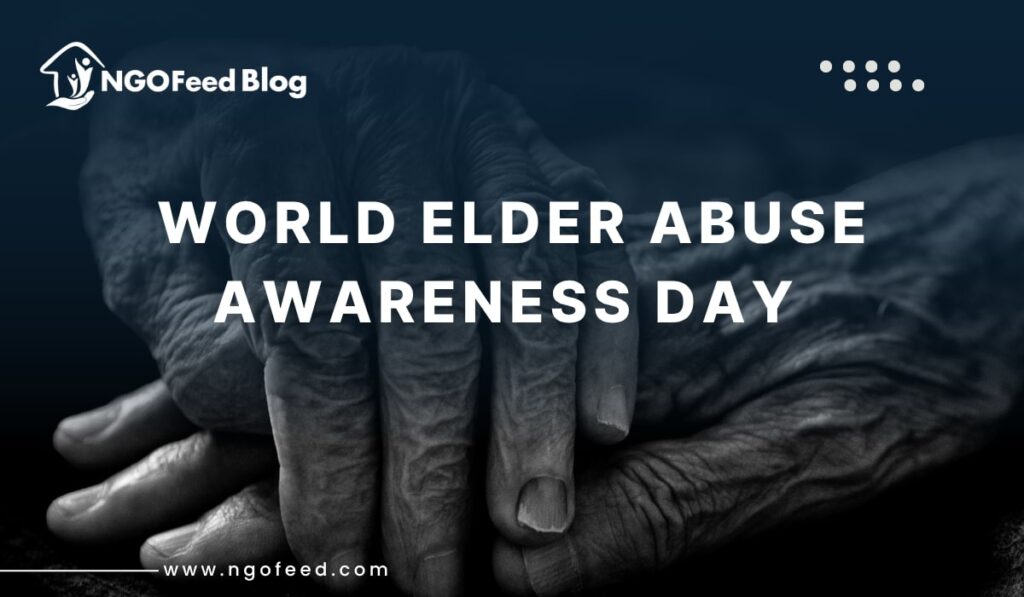Observed every year on June 15, World Elder Abuse Awareness Day (WEAAD) is a somber reminder of the increasing need to safeguard the dignity, safety, and rights of elderly individuals. Millions of seniors—sometimes silent victims—suffer abuse, neglect, or exploitation in a world with a quickly aging population. This worldwide commemoration draws attention to their challenges and acts as a call to action for society at large, including families, governments, NGOs, healthcare organizations, and so forth.
“A society that does not value its older people denies its roots and endangers its future.” – Nelson Mandela
Table of Contents
Why is World Elder Abuse Awareness Day Celebrated/
Celebrating World Elder Abuse Awareness Day aims to:
Also Read: Role of UNHRC in Safeguarding Human Rights
- A human rights problem is elder abuse.
- Draw international attention to the quiet suffering of elderly people in developed as well as emerging nations.
- Encourage people and organizations to use education and activism to stop violence.
- Advocate for more stringent laws, programs, and healthcare systems designed especially to safeguard elderly people.
- Make certain that elderly people live with dignity and freedom, free from dread.
Understanding Elder Maltreatment
The World Health Organization defines elder abuse as “a single, or repeated act, or lack of appropriate action, occurring within any relationship where there is an expectation of trust, which causes harm or distress to an older person. “
Common Types of Abuse
| Type | Examples |
| Physical | Hitting, slapping, improper restraints |
| Emotional | Humiliation, intimidation, isolation |
| Financial | Stealing money, fraud, coercion |
| Sexual | Unwanted or forced sexual contact |
| Neglect | Withholding food, medicine, or care |
| Institutional | Poor care in nursing homes, systemic indifference |
Also Read: Role of NGOs in Senior Citizens
Significance and History of World Elder Abuse Awareness Day
- First noted by the International Network for the Prevention of Elder Abuse (INPEA).
- 2011: Form of official acknowledgement by the United Nations General Assembly under Resolution 66/127.
- Today is a worldwide commemorated day marked in more than 100 nations by policy debates and awareness events.
Key Statistics for Elder Abuse
- Globally, nearly one out of six individuals 60 and above have reported maltreatment (WHO, 2023).
- Just 4% to 14% of elder abuse cases are reported to authorities; many cases go unrecorded.
- Rates of abuse rise during times of crisis, including conflicts, economic hardship, or the COVID-19 epidemic.
- Premature death, deteriorating mental health, and physical deterioration are all results of senior maltreatment.
Global Context
- Context: Among the elderly in developed countries, financial fraud and emotional neglect are increasing.
- Lack of medical care, poverty, and joint family separations contribute to abuse in developing countries.
- Elderly women, especially widows and those with disabilities, experience greater degrees of abuse and desertion.
Also Read: Role of NGOs in Mental Health
World Elder Abuse Awareness Day 2025 theme:
“Empowering Seniors: Upholding Rights, Ensuring Dignity”: The topic of this year emphasizes the critical need to change society’s view of elderly people from being dependents to active rights holders who must be empowered to live full, safe, and respected lives.
Source: https://elderabuseawarenessday.org.au/
Role of global entities and the United Nations (UN)
- Champions of the inclusion of elder abuse prevention in worldwide human rights systems.
- Backs the Madrid International Plan of Action on Ageing (2002).
- Encourages nations to enact age-sensitive legal changes and social safeguards.
World Health Organization (WHO)
- Formulates international rules on elder abuse and data.
- Conducts training for healthcare providers to detect and manage abuse.
- Encourages active and healthy aging paradigms.
Also Read: Role of WHO in Healthcare
Organizations and civil societies
Other groups like HelpAge International and Age Well Foundation provide advocacy, legal advice, support, and counseling for senior citizens.
World Elder Abuse Awareness Day: India’s Perspective
By 2050, India’s elderly population is expected to number 350 million. Modern issues, including migration, urbanization, and growing healthcare expenses, exacerbate neglect and mistreatment despite respect for elders.
Major Indian Projects:
- Maintenance and Welfare of Parents and Senior Citizens Act 2007: Makes it a must for children to maintain their parents.
- Offers advantages and gives social security first priority under the National Policy on Older Persons (1999).
- National hotline for elder support, Elderline (14567).
- HelpAge India and other NGOs offer legal assistance, senior abuse hotline, and direct help.
Also Read: Role of NGOs in Cancer Care
Strategies for Prevention
- Legal Frameworks: Enact and enforce tough legislation with simple reporting systems.
- Train family members and carers in respectful elder care.
- Set up elderly citizen organizations, fitness centers, and play spaces.
- Independent aging can be supported with telehealth, safety apps, and digital monitoring technology.
- Intergenerational Discussions: Inspire young people and the elderly to show respect, compassion, and mutual learning.
How You Might
- HelpSpeak up: Report elder abuse right away if you have reason to believe it.
- Volunteers: Visit a nearby home or spend time with seniors in your neighborhood.
- Teach: Distribute information on elder dignity, resources, and rights.
- Support: Provide lonely seniors with emotional, legal, or financial assistance
Also Read: Role of NGOs in HIV and AIDS Awareness and Prevention
Conclusion
World Elder Abuse Awareness Day reminds the whole world powerfully that for a genuinely inclusive and compassionate society, older people must be treated with respect, compassion, and justice. From governments and institutions to households and people, everyone’s responsibility to guarantee safety and dignity in old age grows as we live longer. Celebration should be extended for aging; it should not be dreaded, forgotten, or abused. Preserving our future is achieved by honoring our seniors now.

